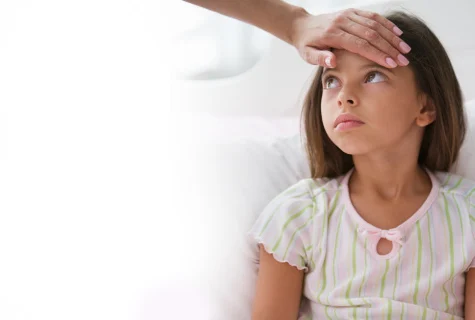Flu is often more severe than a cold and it can really make your child feel sorry for themselves. But there’s plenty of ways you can nurse them back to their usual happy self.
From making sure they get lots of rest, to helping bring down a fever or soothe aches and pains, there’s lots of ways to give your little one the very best care you can.
How do I know if my little one has a cold or flu?
With a cold, their symptoms, like a runny nose or cough, usually develop gradually.
Flu can be a lot more severe and your child’s symptoms can be different. So they might get chills or have a rapid fever.
Flu can come on very quickly and leave your child feeling especially out of sorts.
Look out for these common flu symptoms:
They have a fever that comes on rapidly
Aches and pains in their muscles
They have a headache
They look or feel very tired
They have chills
A dry or chesty cough.
How can I help them feel better?
There’s no cure for flu and it can’t be treated with antibiotics because the cause is a virus, rather than bacteria. But don’t worry, there are lots of ways you can help make your little one feel better. The most important thing is to help make them feel comfortable.
Are they running a fever?
As a parent it can be very worrying if your child has a high temperature (over 37.5°C). But it is very common and often clears up by itself. While it lasts, here are some options:
Keep them cool – don’t wrap them up too warmly, if they’re in bed, a light sheet should be fine.
If they are distressed you can use a paracetamol-based medicine, like CALPOL® Infant Suspension or CALPOL® SIXPLUS™ Suspension. It starts to work on a fever in just 15 minutes.
Are they suffering from aches and pains?
Aches and pains can make it hard for your little one to settle and get the rest they need. Here are some options that can help:
A paracetamol-based medicine can provide pain relief, like CALPOL® Infant Suspension. It’s suitable for most babies from 2 months.
Are they 6 years or older? You could try a paracetamol-based medicine for older children, like CALPOL® SIXPLUS™ Suspension.
Do they have a blocked or stuffy nose?
See our tips on clearing a blocked nose, including using a nasal spray.
Handy tip
For older children, chicken soup can be very comforting. It’s a tasty way to help make sure they get enough fluids.
Some more simple tips
Make sure your child gets plenty of restful sleep.
Your child might lose their appetite – this should only last a few days. Just let them eat when they are hungry.
Make sure they have plenty to drink. If they have started eating solid food, offer lots of cool drinks, especially water.
How long will it last?
Symptoms develop after one to three days.
Most people feel better within a week.
They may feel tired for longer.
How long will my little one remain infectious?
Your little one can start passing flu on to others a day before their symptoms start
Normally flu remains infectious for a further five or six days after symptoms start but for children this can be longer.
When to call the doctor
When your little one gets the flu, it can be unpleasant but they’ll usually start to feel more like themselves after a few days.
If they’re normally fit and healthy then they should be able to recover at home. If your little one also suffers from a long term condition, such as diabetes for instance, then get in touch with your GP as flu could be more complicated for them.
The information on this page is not exhaustive. You know your child best, if you have any concerns about your child, you should contact your GP.
See also
Fever (high temperature)
When your child suffers from a fever, it can be a sign that their body is fighting off an infection. Make sure you know what to look out for and when a high temperature becomes serious.
Aches & pains
Every child suffers aches and pains as they’re growing up. Find out what might be causing them and what you can do to help.
Contact the HSE
For health advice and reassurance.
1850 24 1850







